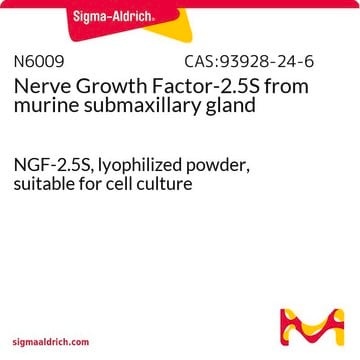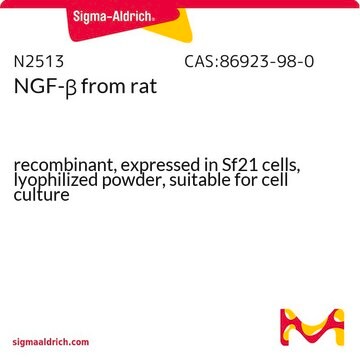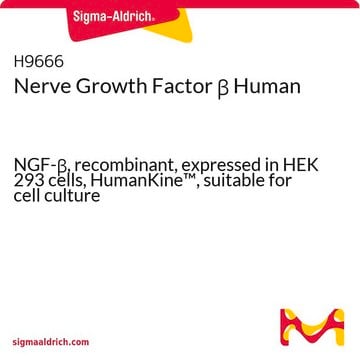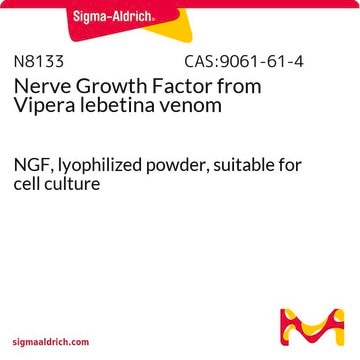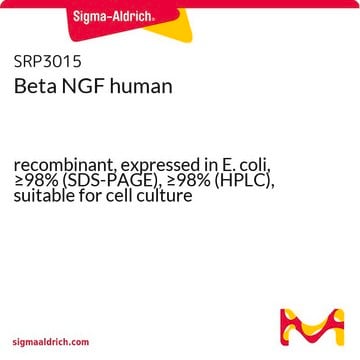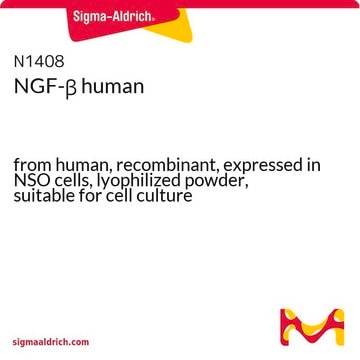N0513
Nerve Growth Factor-7S from murine submaxillary gland
NGF-7S, lyophilized powder, suitable for cell culture
Synonym(s):
NGF-7S
Sign Into View Organizational & Contract Pricing
All Photos(1)
About This Item
Recommended Products
biological source
mouse
form
lyophilized powder
potency
2-250 ng/mL ED50/EC50
quality
endotoxin tested
mol wt
protein 130 kDa
packaging
pkg of 0.1 mg
technique(s)
cell culture | mammalian: suitable
impurities
≤10
color
white
UniProt accession no.
storage temp.
−20°C
Gene Information
mouse ... Ngf(18049)
General description
Nerve growth factor (NGF) is a dimer of 118-residue polypeptide chains linked non-covalently. Both these polypeptides contain three intramolecular disulphide bridges. It forms the prototype of the neurotrophin growth factor family. In male mouse submandibular salivary gland, NGF is present in high amounts, and is present as a high molecular weight complex called nerve growth factor-7S (NGF-7S). NGF-7S is an α2β2γ2 complex, where β2-NGF is the active neurotrophin, and is linked to the dimers of the glandular kallikrein serine proteinases members, α-NGF and γ-NGF.
Application
Nerve Growth Factor-7S (NGF-7S) from murine submaxillary gland has been used for the treatment of following cells to induce neuronal differentiation-
- PC12
- Dorsal root ganglia (DRG) obtained from chick embryos of either sex (Gallus gallus)
Biochem/physiol Actions
Nerve growth factor (NGF) is a neurotrophin, which facilitates the differentiation and survival of specific subtypes of neurons of central nervous system and peripheral nervous system. However, nerve growth factor-7S (NGF-7S) lacks any neurotrophic activity as most part of β-NGF subunit is buried within the NGF-7S complex.
Physical form
Lyophilized from 0.2 μm filtered solution in 25 mM sodium phosphate, pH 7.0.
Preparation Note
Nerve growth factor-7S (NGF-7S) is isolated from male mouse submaxillary glands using a modification of the method of Varon, et al.
Analysis Note
The biological activity is measured using a 3-day MTT assay.
Storage Class Code
11 - Combustible Solids
WGK
WGK 3
Flash Point(F)
Not applicable
Flash Point(C)
Not applicable
Personal Protective Equipment
dust mask type N95 (US), Eyeshields, Gloves
Certificates of Analysis (COA)
Search for Certificates of Analysis (COA) by entering the products Lot/Batch Number. Lot and Batch Numbers can be found on a product’s label following the words ‘Lot’ or ‘Batch’.
Already Own This Product?
Find documentation for the products that you have recently purchased in the Document Library.
Julien Falk et al.
The Journal of neuroscience : the official journal of the Society for Neuroscience, 34(2), 373-391 (2014-01-10)
The elongation rate of axons is tightly regulated during development. Recycling of the plasma membrane is known to regulate axon extension; however, the specific molecules involved in recycling within the growth cone have not been fully characterized. Here, we investigated
Phong Duong et al.
Biology of sex differences, 11(1), 12-12 (2020-04-01)
The role of sex hormones on cellular function is unclear. Studies show androgens and estrogens are protective in the CNS, whereas other studies found no effects or damaging effects. Furthermore, sex differences have been observed in multiple oxidative stress-associated CNS
Hsien-Tung Chen et al.
Journal of biomedical materials research. Part B, Applied biomaterials, 84(1), 256-262 (2007-05-22)
This study provides in vitro and in vivo evaluation of rat serum metabolites of the Pueraria lobata (SMP) on peripheral nerve regeneration. In the in vitro study, we found that the SMP caused a marked enhancement of the nerve growth
Jinhuan Wei et al.
Journal of neuroinflammation, 19(1), 32-32 (2022-02-04)
Peripheral nerve injury (PNI) is a public health concern that results in sensory and motor disorders as well as neuropathic pain and secondary lesions. Currently, effective treatments for PNI are still limited. For example, while nerve growth factor (NGF) is
Héctor I Rocha-González et al.
Journal of neurophysiology, 100(1), 169-184 (2008-04-04)
Adult primary afferent neurons are depolarized by GABA throughout their entire surface, including their somata located in dorsal root ganglia (DRG). Primary afferent depolarization (PAD) mediated by GABA released from spinal interneurons determines presynaptic inhibition, a key mechanism in somatosensory
Our team of scientists has experience in all areas of research including Life Science, Material Science, Chemical Synthesis, Chromatography, Analytical and many others.
Contact Technical Service